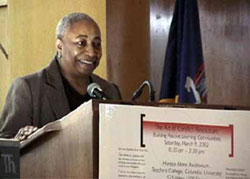New Teacher Institute Looks at the Art of Conflict Resolution
Katharine Unger, Founder and Director of Teachers College New Teacher Institute (TCNTI), welcomed over 120 teachers, program facilitators, conflict resolution experts, and distinguished guests from Stamford, Philadelphia, Bushwick (Brooklyn), and Harlem, at the 3rd Annual TCNTI Conference Day, The Art of Conflict Resolution: Building Positive Learning Communities. "All of us at the Institute have one mission and one goal, and that's to help new teachers succeed," Unger said. "You're the folks who are doing the work."
The first plenary session featured Muriel Tillinghast, Executive Director of Head Start, long-time civil rights activist, and recent U.S. Vice Presidential candidate. She shared from her extensive background in education, organizing, politics, conflict resolution and community building. Her message focused on the central role of teachers as models, as life-long learners, and as builders of positive learning communities in their classrooms. "You have to help those children learn how to respect each other...how to work together...how to establish relationships with each other. If they don't respect each other, they won't respect you...You are more than just a textbook; you are the world the child adopts."
Ellen Raider was the co-founder and first Training Director of the International Center for Cooperation and Conflict Resolution (ICCCR) at Teachers College. She has designed conflict resolution programs for numerous groups such as the New York City Board of Education, UNICEF, the American Friends Service Committee, and the US/USSR Trade Negotiation Project.
Raider focused the audience on the core issues in conflict resolution. Using illustrations, she told the audience that conflict resolution is central to the building of communities and resolving issues present in classrooms and playgrounds, religions and races, cultures and countries. She labeled five basic perspectives on meeting needs that generally vary with maturity: egocentric, one-sided, reciprocal, collaborative, and interdependent. Using a rich set of illustrations and examples, she defined the difference between negotiation and mediation and their roles in the lives of students and teachers. She pointed out that a "win-win" situation is often not an optimal resolution of a conflict. A "win" implies and may depend on an equivalent loss.
From the plenary session, four seminar leaders from the ICCCR led participants in an introductory course in CR. The seminar leaders were: Marc Roennau, Keisha Hayes, Kathy Cochran, and Kathy Vaughn.
After lunch, the seminar leaders broke the participants into groups based on their students' ages. These sessions focused on issues and techniques appropriate to their specific needs.
David A. Paterson, Harlem's Senator in the New York State Assembly, Columbian graduate and adjunct professor at Columbia, was the luncheon speaker. He brought together his experience as New York's youngest elected state senator, his blindness, his early participation in an institute dedicated to conflict resolution, and his encouragement of educators to feed their experience back into the political process.
After the afternoon seminars, a panel of the seminar leaders and speakers also included Marcy May, Executive Director of the EARS program in the Bronx, who brought Kwasi Shields and Shawnta Washington, students who participate in peer mediation through the EARS program, and Saran Shields, an EARS staff developer in peer mediation. They were joined by Gloria Pagan from the John Jay High School (Bushwick) Conflict Resolution program. The panel provided an insightful, "up close and personal" view of conflict resolution.
Published Friday, May. 3, 2002
